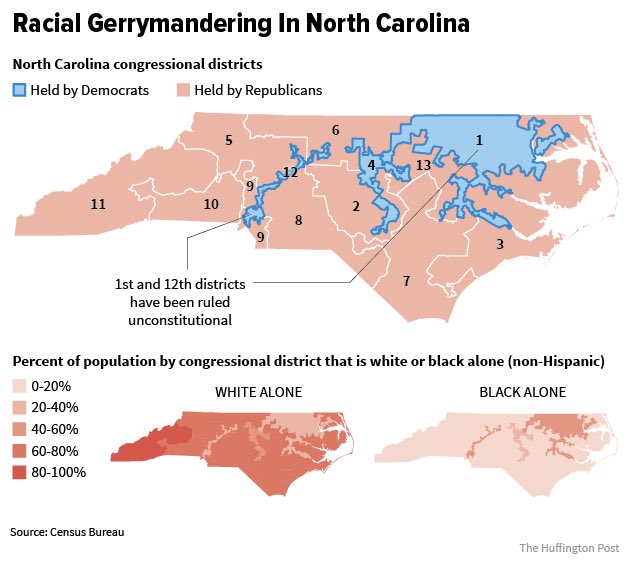I don't mean to attack you, as i am sure you are well informed about most of the arguments i am about to make...
...but the "racial gerrymandering" narrative of US Democrats has big loads of capital P Phony in it.
What people in these moments of outrage seem to overlook is that there are two opposing motives at play that are not naturally reconcilable and in practise usually prove contradictory:
The game theory for African Americans:
1) One can aim to maximise the number of majority minority districts with the expectation of having these districts elect minority candidates, thus maximising the number of minority delegates - in this case in the House of Representatives.
2) One can maximise the "efficiency" of the minority vote, their leverage in general.
2) One can maximise the "efficiency" of the minority vote, their leverage in general.
What the law actually said, until the 2013 Scotus decision:
1) African Americans (first and foremost) have to be enabled to elect representatives from their communities which supposedly could only be the case when they are as often as sensible and feasable put in the position of making up half of their district or more.
As per the Voting Rights Act.
2) African Americans can't be "packed", or in any way overrepresented, thus possibly rendering their votes less "effecient" for any reason other than compliance with the VRA.
As per the 14th ammendment.
As per the Voting Rights Act.
2) African Americans can't be "packed", or in any way overrepresented, thus possibly rendering their votes less "effecient" for any reason other than compliance with the VRA.
As per the 14th ammendment.
Tthe ways courts had ruled on this over the decades basically was: A district where i minority is overrepresented compared to the state's average must be a majority minority district but can't be unneccessarily ineffecient, i.e. the minority vote share has to be expected above 50% but as close to that as possible.
Then we have the game theory for white partisans:
1) Democrats get screwed by the VRA because their voters get packed. In most places 50% is just too much. They have white Democrats in those districts and this is all in states where Democrats are a minority in the first place. This is terrible from their view, a fecalshow.
They want to spread the African American vote accross an effecient number of districts to elect as many Democrats as possible. Typically white ones.
2) Republicans gladly - cynically - obey the VRA. They then try to distribute the remainder of Democratic votes in a state so that inefficiency (blue ineffeciency) is maximised.
I am pilfering 538's podcast on racial gerrymandering obviously.
And they correctly point out how this dubious district did what the law required it to do.
They travel to Greensboro, which used to be part of this district.
You know, that Greensboro:
Spoiler :

Now the new 12th, the one additional "black" district that had been so awkwardly created as mandated by the VRA, is now over a hundred miles away. It's a compact district; basically it's Charlotte.
We will get back to it.
As you can see in the above link, Greensboro - arguably too small to dominate its own district anyway - is split among two rural districts, represented by Ted Budd and Mark Walker. White, male, Republicans.
Obviously this whole set of conditions is also arguably not that terribly helpful anymore for African Americans anyway, particularly once we were to look at state legislatures:
The VRA doesn't pay respect to how African Americans have become a de facto virtual one-party minority and thus enables them to (inefficiently) elect representatives who are then doomed to permanent partisan minority.
The new 12th district is represented by Alma Adams. Easily. The district is inefficient. It's rated D+18. That's a lot.
This is deemed necessary to make the following bet:
The districts makeup is 48%W, 38%B, 14%H.
Alma Adams is, obviously, African American and a woman.
So the bet pays: What has to be achieved - white people helping to elect black congresspersons - actually happened.
Now, this is Charlotte. Look at the numbers.
Where are you willing to make the same bet with the same numbers?
Arkansas?
Mississippi?
Do i have to get the flag of Mississippi?
Do you see how far we are from Charlotte, NC?
Nevermind that all accross the South-West you have district after district with 35% hispanic population, electing boatloads of white persons.
Point is:
1) This is not as easy as one might at first think.
2) In many places there is no good solution for politicians to find, even if they tried in good faith (often enough they sure don't).
Often some blame has to be put back on the voters.
Last edited:

